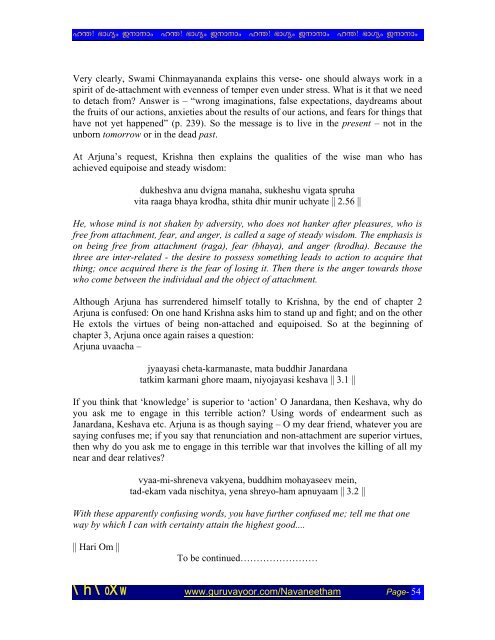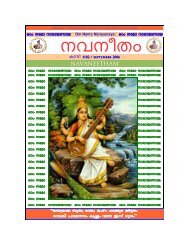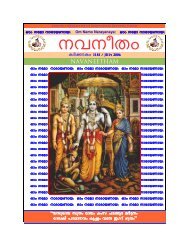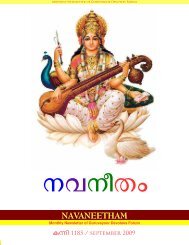Navaneetham - Guruvayoor / Guruvayur
Navaneetham - Guruvayoor / Guruvayur
Navaneetham - Guruvayoor / Guruvayur
Create successful ePaper yourself
Turn your PDF publications into a flip-book with our unique Google optimized e-Paper software.
pÉ! g¡L¬« Qc¡c¡« pÉ! g¡L¬« Qc¡c¡« pÉ! g¡L¬« Qc¡c¡« pÉ! g¡L¬« Qc¡c¡«<br />
Very clearly, Swami Chinmayananda explains this verse- one should always work in a<br />
spirit of de-attachment with evenness of temper even under stress. What is it that we need<br />
to detach from? Answer is – “wrong imaginations, false expectations, daydreams about<br />
the fruits of our actions, anxieties about the results of our actions, and fears for things that<br />
have not yet happened” (p. 239). So the message is to live in the present – not in the<br />
unborn tomorrow or in the dead past.<br />
At Arjuna’s request, Krishna then explains the qualities of the wise man who has<br />
achieved equipoise and steady wisdom:<br />
dukheshva anu dvigna manaha, sukheshu vigata spruha<br />
vita raaga bhaya krodha, sthita dhir munir uchyate || 2.56 ||<br />
He, whose mind is not shaken by adversity, who does not hanker after pleasures, who is<br />
free from attachment, fear, and anger, is called a sage of steady wisdom. The emphasis is<br />
on being free from attachment (raga), fear (bhaya), and anger (krodha). Because the<br />
three are inter-related - the desire to possess something leads to action to acquire that<br />
thing; once acquired there is the fear of losing it. Then there is the anger towards those<br />
who come between the individual and the object of attachment.<br />
Although Arjuna has surrendered himself totally to Krishna, by the end of chapter 2<br />
Arjuna is confused: On one hand Krishna asks him to stand up and fight; and on the other<br />
He extols the virtues of being non-attached and equipoised. So at the beginning of<br />
chapter 3, Arjuna once again raises a question:<br />
Arjuna uvaacha –<br />
jyaayasi cheta-karmanaste, mata buddhir Janardana<br />
tatkim karmani ghore maam, niyojayasi keshava || 3.1 ||<br />
If you think that ‘knowledge’ is superior to ‘action’ O Janardana, then Keshava, why do<br />
you ask me to engage in this terrible action? Using words of endearment such as<br />
Janardana, Keshava etc. Arjuna is as though saying – O my dear friend, whatever you are<br />
saying confuses me; if you say that renunciation and non-attachment are superior virtues,<br />
then why do you ask me to engage in this terrible war that involves the killing of all my<br />
near and dear relatives?<br />
vyaa-mi-shreneva vakyena, buddhim mohayaseev mein,<br />
tad-ekam vada nischitya, yena shreyo-ham apnuyaam || 3.2 ||<br />
With these apparently confusing words, you have further confused me; tell me that one<br />
way by which I can with certainty attain the highest good....<br />
|| Hari Om ||<br />
To be continued……………………<br />
\h\oXw www.guruvayoor.com/<strong>Navaneetham</strong> Page- 54





